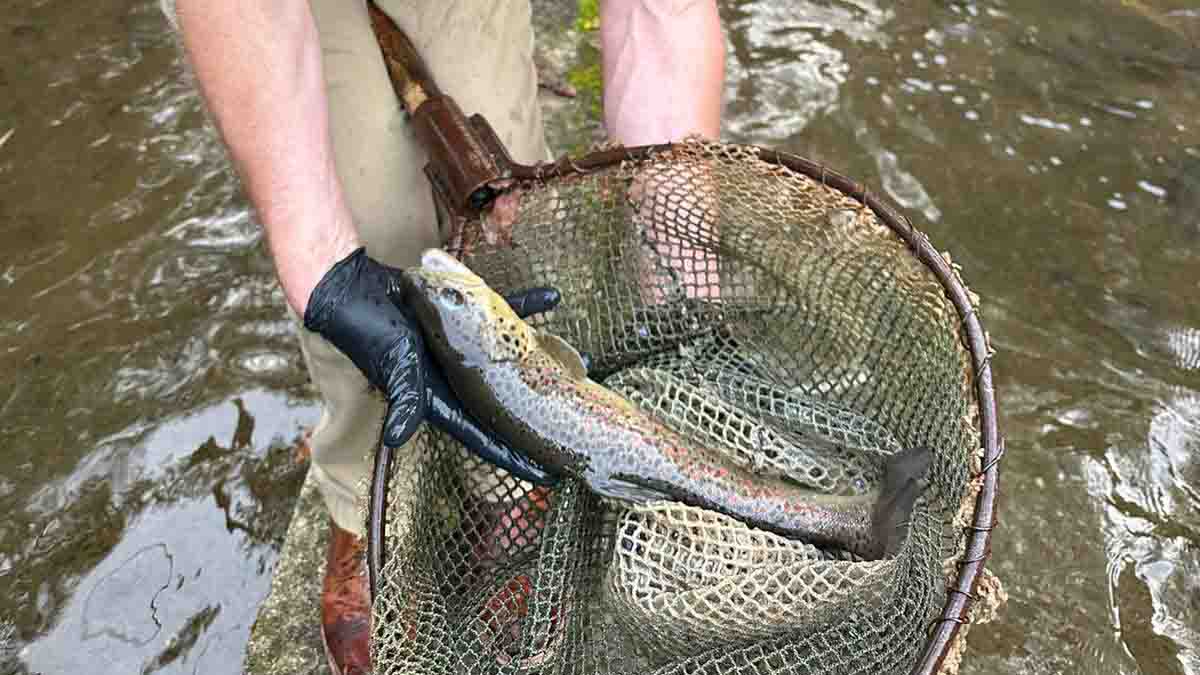ARI Aiding Aquaculture Abroad
February 21, 2024
Scientists with University of Idaho’s Aquaculture Research Institute (ARI) are leading an effort to establish rainbow trout production as a significant industry in the transcontinental country of Georgia.
Trout are popular fare in Georgia, a former Soviet Republic located in the Caucasus region in Eastern Europe and West Asia. While Georgia possesses the natural resources and much of the infrastructure necessary to scale up its domestic fish production, it lacks expertise in aquaculture and currently imports most of its trout from bordering Turkey.
The U.S. Department of Agriculture’s Foreign Agricultural Service (FAS) identified trout production as an agricultural sector in Georgia with tremendous growth potential. FAS officials contacted ARI Director Brian Small to lead the Caucasus Agricultural Development Initiative (CADI) — a project teaching modern aquacultural practices to Georgia’s existing fish producers, while also preparing native Georgians to become aquaculture trainers.
“That speaks really well for the reputation that we have here, nationally as well as internationally, that they quickly identified ARI as the go-to trout experts,” said Jacob Bledsoe, a U of I assistant professor and aquaculture research and Extension specialist who serves on the CADI team.
The team also includes Small, ARI Associate Director Matt Powell and Dr. Stephen Reichley, a fish health expert with Mississippi State University’s College of Veterinary Medicine.
The project is initially focused on bolstering aquaculture within Georgia’s Adjara region, a popular tourist destination located on the Black Sea’s southeastern coast.
“The Georgian agriculture ministry would like to have stronger rainbow trout production, supplying whole-body, head-on gutted trout to serve the tourism industry,” Bledsoe said.
While there are a few modern aquaculture facilities in Georgia, many fish farms are more rudimentary, operating out of earthen ponds. USDA employees with the U.S. Embassy in Georgia conducted surveys prior to the start of CADI to identify current fish farmers and to document the scope of aquacultural expertise in the Adjara region.
Bledsoe, Small and Reichley made the first of three weeklong trips to Georgia in October of 2022 and toured many of the fish farms identified by the survey. A few of the modern facilities have agreed to serve as demonstration farms for less sophisticated farms seeking to modernize.
The three researchers returned to Georgia in June of 2023 and again in October of 2023. During the trips, they’ve given farmers equipment and supplies, such as microscopes to aid in diagnosing diseases and kits for testing water quality. The CADI team identified poor disease diagnostics as a challenge in Georgia. They have a research project underway at ARI’s Hagerman Fish Culture Experiment Station to bulk sequence DNA swabs from Georgian fish farms to identify the major bacteria, viruses, fungi and parasites of concern. Based on the findings of this study, the CADI team aims to identify the most appropriate medications and therapeutants, before working with importers and regulators to help make them available to Georgian farmers.
The trainers they’re educating will work with the nonprofit agricultural outreach program Farmer of the Future to develop short courses for aspiring fish farmers.
They’ve also provided data loggers, which will be placed at certain fish farms to remotely monitor water quality over the course of a year. Interns from a newly created Aquaculture Extension Center associated with Georgia’s Batumi Shota Rustaveli State University will travel to farms and oversee data collection.
In March, a group of 10 to 15 Geogian fish farmers, as well as representatives from the country’s new Extension center and the Ministry of Environmental Protection and Agriculture of Georgia, will spend a week at ARI’s Hagerman facility learning about the U.S. trout industry.
The CADI team has evaluated Georgia’s supply chain constraints and aims to identify new sources of feed and trout genetics. The project could open markets for U.S. aquaculture germplasm, soybeans and fish feed suppliers.
“We have a year or two ahead of us to wrap up things in Ajara,” Bledsoe said. “Time will tell if FAS wants to continue to expand this and roll out into other regions under the CADI umbrella.”
The project, “Bolstering Fish Culture Education, Extension and Outreach in Georgia,” is supported by a grant through USDA-FAS for up to $1 million over five years, with the federal award No. FX22TA-10960R006.

About the University of Idaho
The University of Idaho, home of the Vandals, is Idaho’s land-grant, national research university. From its residential campus in Moscow, U of I serves the state of Idaho through educational centers in Boise, Coeur d’Alene and Idaho Falls, nine research and Extension centers, plus Extension offices in 42 counties. Home to nearly 11,000 students statewide, U of I is a leader in student-centered learning and excels at interdisciplinary research, service to businesses and communities, and in advancing diversity, citizenship and global outreach. U of I competes in the Big Sky and Western Athletic conferences. Learn more at uidaho.edu.






